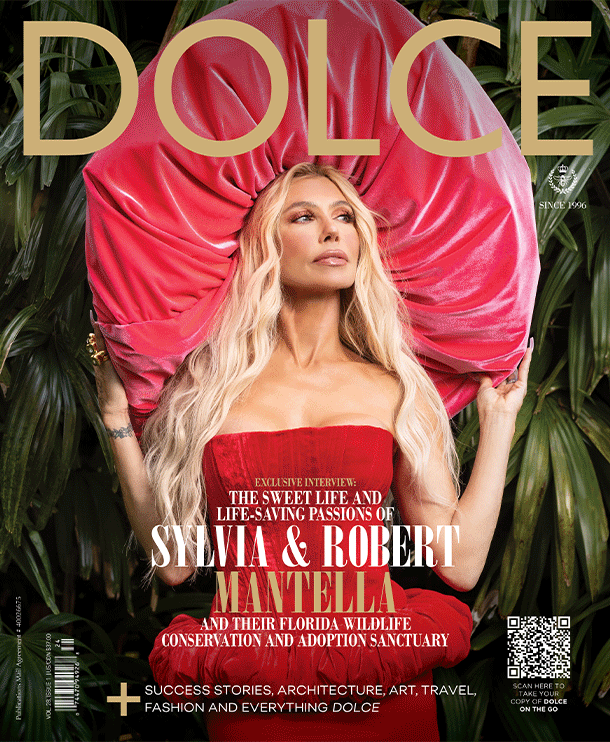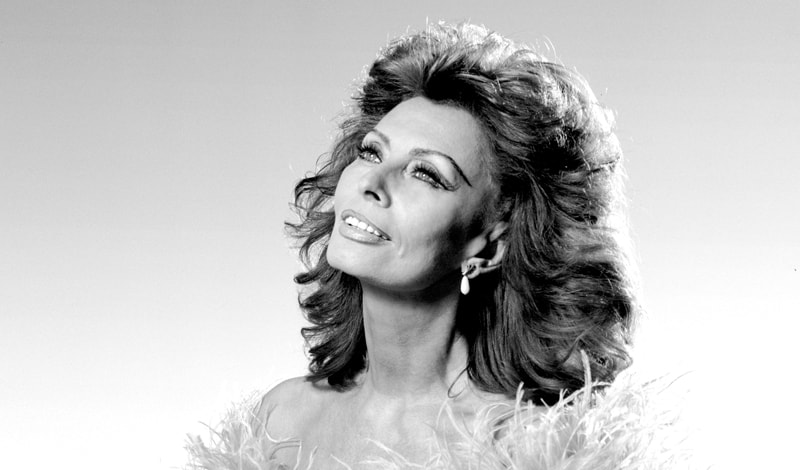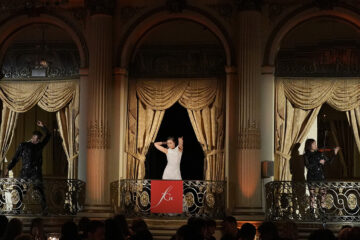Queen Of Hearts – Sophia Loren
More than six decades have passed since Sophia Loren first lent her talents to the blossoming film industry. Now, she remains a lone survivor, the last precious piece of a priceless congregation that was the Golden Age of Hollywood.
Written by Jan Janssen
Be it on the silver screen, bedecked in the trappings of movie-going glamour and the bright lights of cinematic history or on the red carpets of premières and industry events, there are few more wondrous sights than the Hollywood actress. They have etched themselves into the fabric of film history: Kelly, Hepburn, Monroe, Deneuve, Lake — their names forming a pantheon of poise, grace and beauty that has withstood generations.
Many of these women have passed into history, but one still remains: as headstrong and unattainable as ever, like a russet-plumaged exotic bird, the mere glimpse of which sends pulses racing. With her warm and exuberant Italian mannerisms, old-school glamour and occasional devastating sensuality, Sophia Loren sweeps into places safe in the knowledge that she is destined to be the centre of attention wherever she goes.
“It’s been wonderful, extraordinary in every sense,” the European darling of Hollywood’s Golden Age breathes on the subject of her rich and varied career. “I always saw things positively, and I have not stopped thinking that way,” she says.
“When you have accomplished certain things and reached levels you could never even dream of, it is very difficult to judge who you have become and what you have experienced. Today, I can say that I am aware of having lived a very full life and lived very intensely. I don’t think I could have lived with any more passion than I have.”
Of course, Loren — born Sofia Villani Scicolone in the Clinica Regina Margherita, Rome — has to her name a list of accomplishments that would put any modern actress in the shade (and one suspects that would be most pleasing to this joie de vivre–filled film icon).
But the origins of her journey into Hollywood lore were a far cry from the glamour she would come to be associated with. Life as the daughter of unmarried parents in staunchly conservative Catholic Italy, at the height of Benito Mussolini’s fascist powers, was uncompromising and often brutal. Her family was poor, though the young Loren was for the most part shielded from the harsh realities of poverty.
“Today, I can say that I am aware of having lived a very full life and lived very intensely. I don’t think I could have lived with any more passion than I have”
“When I was a little girl, we used to eat la panzella, and that translates as ‘the food of the poor people,’” she reminisces. “It’s very basic: stale bread, which you soak in cold water, then you drizzle it with olive oil and top it up with tomatoes, onions and fresh basil. No one ever made it better than my grandmother. When she made it, it meant that there was no money in the house, but as a child, I did not know that. In my innocence, I wished that the hard times would come more often, so that I could always eat it.”
It wasn’t until Loren was 16 years old that the first glimpses of the undeniable star power that would have directors — not to mention a wide selection of leading men — clamouring to see her on film became apparent.
“My mother entered me in a local beauty contest,” she nods. “I was only 14, and I came second. And I got the equivalent of 15 pounds, and for some reason, a roll of wallpaper. The money paid for the fare to Rome, where the film industry was just recovering after the war; I’d wanted to be an actress since I was 10 years old. I have no idea what happened to the wallpaper.”
It was in Rome that the seeds of Loren’s potential on film were planted. A role as an extra in the 1951 epic Quo Vadis followed before she was first spotted by producer Carlo Ponti — a man who would go on to have a bigger influence on Loren than anyone else during her life and career. It was Ponti who arranged for her a series of small parts in low-budget Italian productions, the first rungs on a ladder that moved from Aida (1953) to The Gold of Naples (1954), and finally to America and the City of Angels, to star in The Pride and the Passion alongside Cary Grant and Frank Sinatra.
It would be her compatriot, Ponti, and the established movie star Grant who would go on to spar for the young actress’s affections throughout the 1950s. Cast in a modern light, such a love triangle now seems unthinkable: Loren was in her early 20s, whereas Ponti was 20 years older, and Grant, older still. The latter had begun an affair with Loren during the filming of The Pride and the Passion, despite his still being married and her having a relationship with Ponti. Things came to a well-publicized head — as romantic entanglements in Hollywood are wont to do — a year later on the set of a second Loren-Grant collaboration, Houseboat.
“That was a strange time in my life,” she sighs. “Cary Grant was in love with me and wanted me to marry him, but that would have meant my leaving Carlo Ponti and creating a huge scandal. The American press had been very cruel to Ingrid Bergman when she left her husband, and I was terribly afraid of what the reaction would have been if I had left Italy.”
Her hazelnut eyes, wide and wistful, cloud with memories of Grant, the suave centrepiece of classic Hollywood who was wed five times and had innumerable relationships.
“He was a wonderful man,” she says. “The most elegant and charming man I have ever met. Stunningly handsome. The kind of man who stopped your breath when he walked into a room. He also moved like a dancer, like he was dancing on air. He had a great sense of style when it came to how he dressed and how he behaved in social gatherings. He was also very romantic — someone who would send you hundreds of flowers at a time.”
For all of Grant’s charms, however, there was little he could do to separate Loren from Carlo Ponti, such was the enchanting nature of their quintessentially passionate continental love affair.
“It was love at first sight for both of us,” she says of Ponti, with a tinge of sadness exposing the sheer depth of her emotion for the man, who passed in 2007 at the age of 94. “We met at a beauty contest in Rome when I was 16. And [from] where he was on the jury, he saw me sitting at a table with friends and he sent me a note, asking me to join the contest. I did and I finished second, but the most important thing was that this was how we started to see each other, at first in a very friendly way and then it only became serious when I was 19,” she says.
“I still miss my husband very much, but he’s always with me. I still speak to him. When I’m with my family, we look at his empty chair and we almost expect him to arrive at any moment. Writing my autobiography was a way of keeping my love for him intact. There’s a picture I included in the book, which is from 1954, and which shows Carlo stroking my hair. It’s more revealing of our love than a thousand words.”
To hear Loren speak now so candidly about her relationships with men two or three decades her senior, it is hard not to be mindful of the current sea changes sweeping Hollywood and wider society in terms of female empowerment and equality. In the wake of the Harvey Weinstein scandals and the #MeToo and #TimesUp social media movements, it’s almost impossible to conceive of a similar situation with an up-and-coming actress.
That being said, Loren’s 41-year-long marriage to Ponti exemplifies how lasting affection can be borne out of potentially eyebrow-raising circumstances. Loren, too, hopes that comparisons between her life in Hollywood’s Golden Age and today can be seen for what they are: anachronistic aspersions that in many ways remove the autonomy from trail-blazing young women such as her.
“I was lucky in that I always had good people there to look after me and protect me when I began to work in the cinema,” she explains. “But I was also fortunate in becoming successful in the ’50s when beauty had a different meaning than it has today. There was a wonderful sense of glamour about being an actress, and it wasn’t so commercialized and cheapened the way it often is today,” says Loren.
“There’s a picture I included in the book, which is from 1954, and which shows Carlo stroking my hair. It’s more revealing of our love than a thousand words”
“Now there are so many beautiful young girls trying to become actresses, and there are many people trying to take advantage of them. Today, every young actress, and even models, are becoming famous so soon that they have no time to develop their own personalities and character. They have no life anymore other than their fame, and that’s very dangerous.”
That’s not to say, of course, that Loren is anything other than proud of the greater responsibility women are taking upon themselves to change the myriad injustices in the entertainment industry that have remained hidden behind bright lights and movie posters for far too long.
“I am happy that women are taking themselves more seriously; no one should be taken advantage of,” she declares with more than a little hint of that intrinsic Italian intensity. “I never let that happen to me. I have never found myself in a similar situation to what other actresses have been revealing. Never. Perhaps because I had my mother next to me, who taught me so many things. I could never have allowed myself to be in such a situation, and if it had happened, I would have fled. I understand it, but the solution is there: go away — run.”
Caught up within this ongoing conversation on power dynamics and greater equality, however, is a conceptual cornerstone of the film industry: beauty. Loren, widely considered one of the most stunning women to have walked the Earth, understands that her natural features paved the way from the runways of Italian beauty contests to the screens of American theatres: “I am so blessed,” she smiles. “I never get tired of it. But was it ever a burden? Only when that is all a person sees in you.”
“Beauty has been with us forever,” she continues. “It’s a concept the Greeks and Romans wrote so much philosophy about. It’s an ideal, but there is too much pressure to live up to certain images of what women should look like. There is so much pressure to be very thin, which is unhealthy for young girls. The fashion magazines have created this thin body culture which has gone too far and very, very few women can ever live up to this,” she notes.
“So I think beauty can be a gift as well as a burden. There is always pressure to look your best, and you can get tired of that. I love dressing up and going out, but sometimes you realize that it’s not easy to just walk down the street and buy a loaf of bread. In a way, if you’re an actor, you feel a responsibility to your public, to the illusion that the cinema has created. You have to be polite, you have to maintain an elegance, you have to be true to that persona the public trusts. I want to show as much respect to the public as the public has shown to me during my career.”
Beauty isn’t the only ideal upon which Loren can cast an experienced opinion. At 84, she is without doubt one of the last living vestiges of a sepia-tinted vision of classic cinema, and as such has held an important position on a veritable throne of acting acclaim to oversee the shifting sands and changes wrought upon the industry in the 66 years since her original starring role.
“In a way, I’m glad that my career began in the ’50s. There was a lot less pressure then; we weren’t so age-obsessed,” notes Loren.
“I would rather stay young, but since that’s impossible, I try not to think about it! Aging is a natural process, and I still feel good about who I am and how I look. You have to accept your age. After all, everybody grows older — I’m not the only one. I don’t fight it. The only thing I’m glad about is that everybody else is getting older also. That’s why I don’t believe in this American image of having all these facelifts and implants, and doing so many artificial things to change your appearance. I don’t understand why women want to inject things to make their lips look so fat. It doesn’t look natural at all. But in the acting business, youth is very important, especially now, so there is tremendous pressure on every actress to look as young as possible, and it’s very difficult. I can understand that.”
In many ways, Loren has been phenomenally lucky to be in the position of casting a skeptical eye over the current trend for cosmetic surgery. Her exquisite natural features — “The genes my mother gave me” — are no doubt a large part of that, but she even goes so far as to reveal her secret to having supped at the fountain of eternal youth, the chocolate orbs of her eyes lively and conspiratorial.
“Aging is a natural process, and I still feel good about who I am and how I look. You have to accept your age. After all, everybody grows older”
“I owe everything to spaghetti, not surgery,” she cries with a hearty, throaty laugh bubbling up. “I love simple food, which is something that the Italians do so well. I eat pasta every day. I am lucky enough today to be able to afford caviar, but give me pasta every time,” she exclaims.
“I’m also in better health than I was a few years ago, so things are good,” she continues. “I feel that I have opened the door to serenity in the last 10 or 20 years. I found new things to do in life away from the movies, and it was very interesting, very fulfilling.”
In 2016, Loren returned to the screen for an in-depth interview, televised in front of a live audience at the TCM Classic Film Festival — her way of “going back to my love of the cinema.” The hour-long special alighted on the greatest hits of her career, including her 1962 Academy Award win for a mesmerizing performance as widowed shopkeeper Cesira in Vittorio De Sica’s Two Women.
Alongside this, the show balked with its own tradition in inviting a notable host to this occasion only: Edoardo Ponti, filmmaker, director and the second son of Loren and Carlo Ponti Sr. From Loren’s cameo in sword-and-sandals romance Quo Vadis, to Edoardo’s continuing career, family runs like a vein of precious silver through the bedrock of Italian-American cinematic tradition.
“I give so much credit to my mother, who worked very hard to help me have a career,” she enthuses. “We were so poor that hope is the only thing that kept us going — hope and love and my mother wanting me to have a better life than she had. That’s why family is so important to me. It is hard for me to understand why so many families break down, and why there is so much hate between mothers and daughters, fathers and sons,” says Loren.
“Of course, it is difficult to be a parent and for children to come into their own and not feel conflicts with their parents. But somehow you have to find a way to live together and respect each other. We have to work harder to keep the sense of the family and the spirit of what a family means. I think that’s the key to raising children who have a healthy and positive view of life. Family is everything.”
In spite of her continued lineage in the arts — as well as Edoardo, her eldest son, Carlo Ponti Jr., is a successful orchestra conductor — Loren is enjoying her retirement in a sprawling residence in Switzerland immensely. While many silver-screen stars find it hard to step away from America, this particular icon revels in her individual indifference to the vagaries of contemporary Hollywood.
“I never felt a part of Hollywood; I had no roots there,” she explains. “I always felt like a stranger there because the American mentality is so different from the Italian or European way of life. It would have been different if I hadn’t already made a career in Italy, if I had started out as an actress in Los Angeles and become more familiar with the way the system worked,” she notes.
“Now I live near Geneva, [Switzerland,] but I still adore my country. I drive up into the mountains every weekend just to look at Italy there before me; it is a very special country, very romantic, where people respect each other and where they value family life. Ask any Italian why a weekend family lunch lasts for half the day, and you will always get the same reply: ‘Where else can you get such good company and such great food?’”
With another hearty, healthy laugh she smiles that great wide-eyed smile that has long since stolen the hearts of far greater men than most, a small testament to the rare, intoxicating magnetism that will forever be her legacy.
“Take risks — make sacrifices,” she offers as a final thought. “Life is never easy. There’s no magic wand to wave. But a legend is not a reality, it’s a myth, it’s something that you cannot touch. I have both my feet firmly on the ground. I like solid things. I’m not a legend. I’m a peasant girl at heart.”















































































No Comment